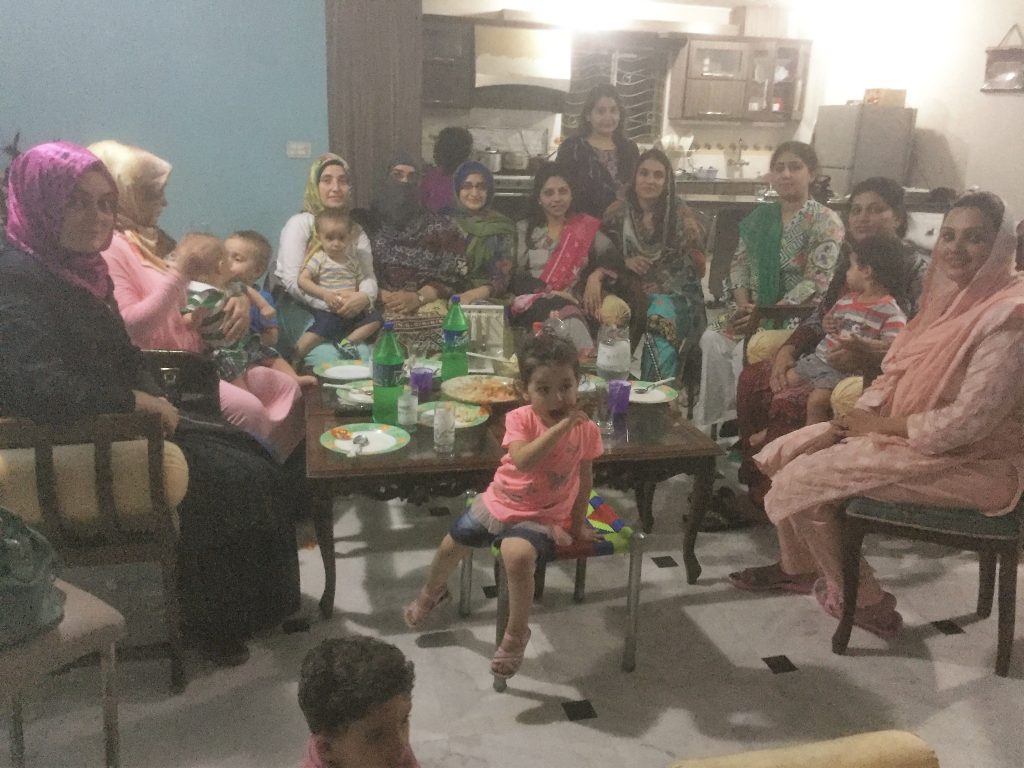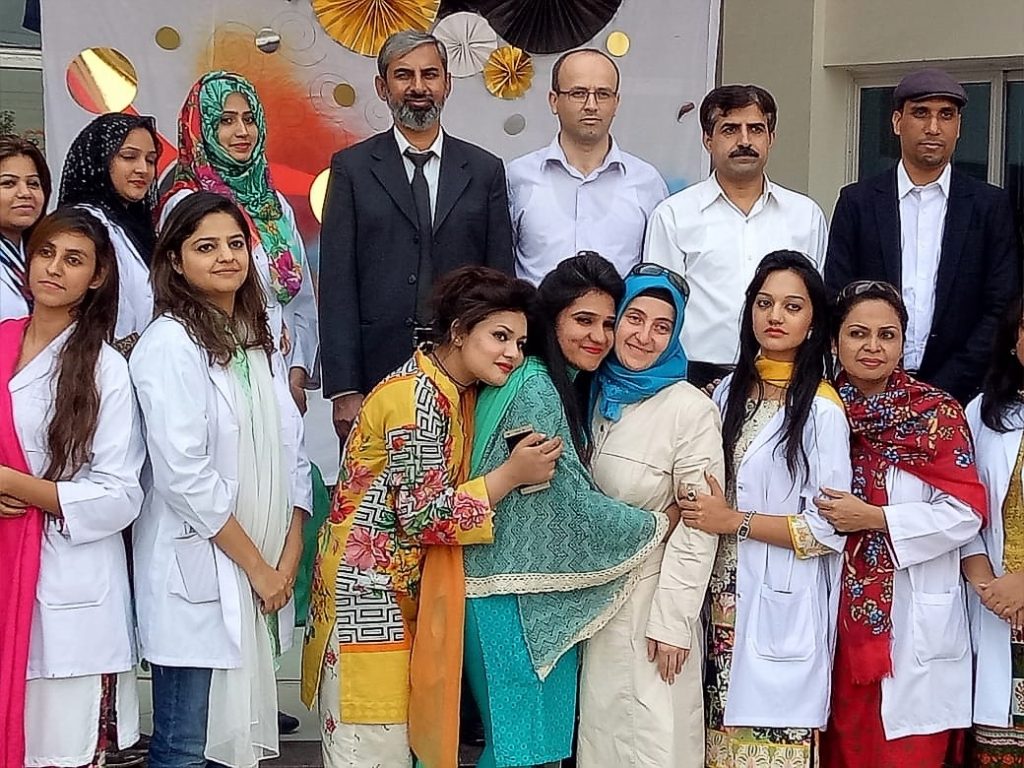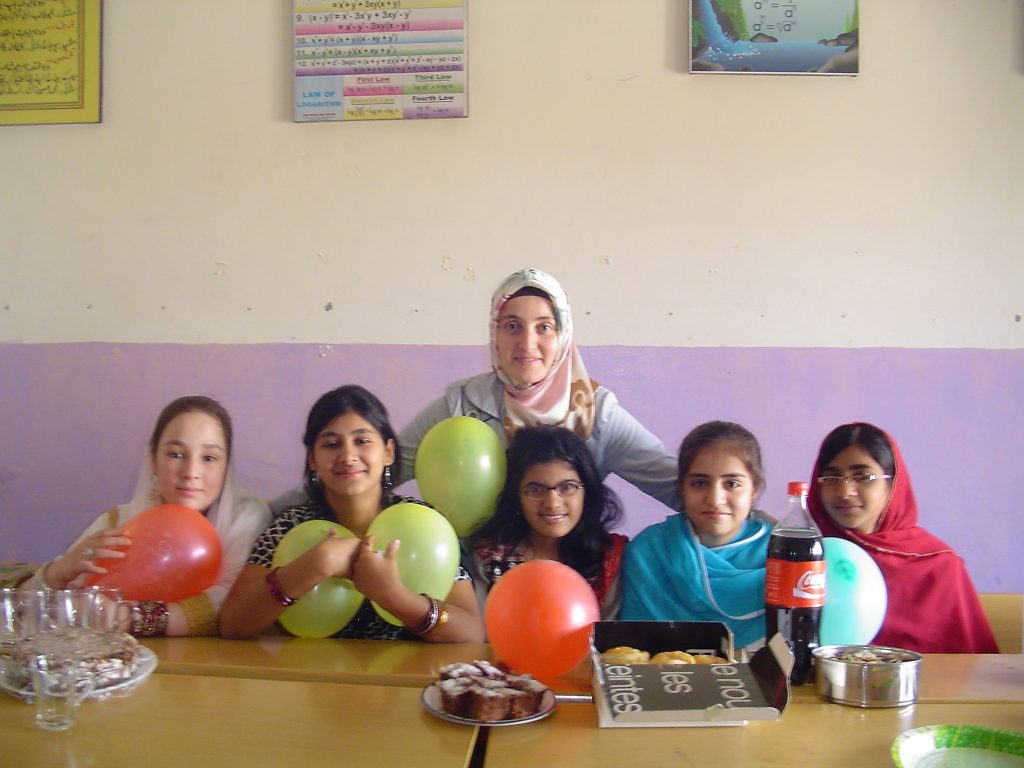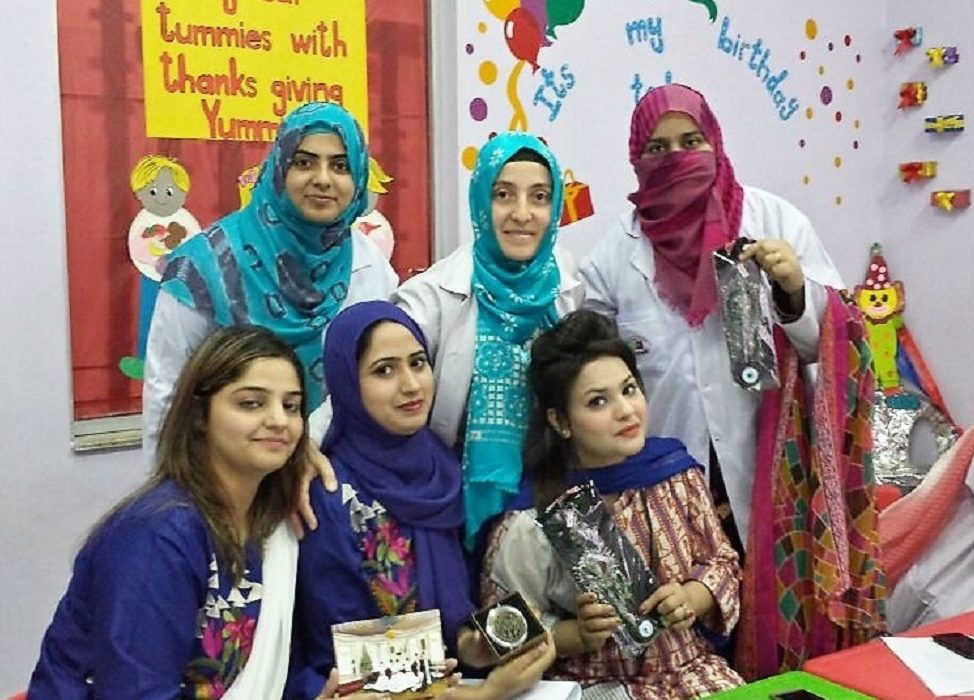English teacher Gönül Barış (4): People of Pakistan are friends in need, they take care of whom they cherish

Business meetings of Karachi Chamber of Commerce delegation in Ankara
April 18, 2022
Those exquisite Ramadans in Pakistan!
April 25, 2022In the last part of our interview, PakTurk Schools English teacher Gönül Barış narrates her years of teaching in Lahore, the friendships she made with the parents of her students, and her experiences shortly before leaving Pakistan.
-You returned to Lahore, where you had been a university student, as a teacher. How was your rapport with students and their parents?
We moved to Lahore in 2013 and stayed there until we left in 2017. I had an altogether experience with the students in Lahore. I was mature in age and my teaching was more settled. My rapport with teachers and students was better. We had different friendships with the students. Our joint reading retreats were more prolific. What’s more, since they were high school students, they had a stronger sense of spirituality.
I started working in a primary school in Lahore. We worked with a very nice headmistress. We shared a room at the school. We were like sisters. For example, I liked drinking green tea in the morning, and she liked drinking doodhpatti (milk tea). We used to fill our cups and sit down to chat. She liked chewing some cardamom in the morning, and she would also offer me. She said it helped improve brainpower. I am still in touch with her; we exchange phone calls and messages. We got along well spiritually. Before starting the day’s work, we would jointly recite Surah al-Fath and Jawshan al-Kabir. She was older than me, but she never imposed that on me.
I taught senior high school classes in my last year in Lahore. They were versatile students with keen sense. We organized book reading programs. It was a heavy program even for me, but they kept on saying “No, this is light, let’s add some more reading materials”. They were truly spiritually-charged students.
We also had a good rapport with the parents. For example, a lady had visited many schools and decided on our school. Back then, I was in charge of admissions. She asked me a few things and I explained. “Okay, I will admit my child here. I made this decision because I met you and loved you very much,” she said. Such a bond of love formed between us and she always cared. I loved her daughter too.
MY STUDENT’S PARENT TRIED EVERY WAY TO SUPPORT US
During the recent events that led to our departure from Pakistan, we witnessed how profound friends the parents of our students were. One parent said she wished to support me financially, but I kindly declined. She said, “Then, give my daughter home tuitions in Turkish in the weekends.” I agreed but I said I would charge no fee. She said “OK” but whenever the student came for the tuition, her mother would send food in parcels with a note, “These are for your kids.” She fashioned such a way to help us. She even called when I went from Pakistan to Georgia, and said “If you need money or anything else, I’ll send it right away.” She was like a big sister.
-When did the troubles start in Pakistan? What did you experience during that phase?
Actually, as PakTurk teachers, we faced official complications from 2015 onwards. Yet, we never thought we would be treated so bitterly in the end. We continued as if nothing had been amiss. For example, our visas had not been extended in 2015. I was pregnant with my second son, Mehmet Selim. The birth was to be in August. We combined my summer vacation with my maternity leave. We went to Turkey before our child was born. We were to leave Turkey 40 days after the birth. We purchased our airline tickets and needed to get a visa for the baby. We submitted the passports to the Embassy of Pakistan for the visa but they did not issue a visa for the baby. We were confused. I kept on weeping because I couldn’t go to Pakistan. My mother said, “Every year we wept because we sent you away, and this year we weep because you can’t go!” My husband struggled for 15 days. Later, with someone’s reference, our visa was issued. That trip was very special for us. It was as if we were going to Pakistan for the first time.

On July 15, 2016, a dastardly incident happened in Turkey. We continued with our teaching in schools. We used to have our administrative meeting at school every Monday. It was yet another Monday in October 2016. That day, we talked about the student programs we would be hold in the forthcoming winter break. My husband was very upset when he came home, but he said nothing. When we went to school the next day, we heard the bad news for sure. We were told that we had to leave Pakistan within three days. It was broadcast on all TVs with tickers and news reports saying “Turks are being deported”. Everyone was talking about it. I was shocked, stunned. I could attend no class. I just kept on crying. We would sit down with colleagues and weep.
IN THE TOUGHEST PERIOD, I SAW THE HOLY PROPHET IN A DREAM
There was a coffee table in our office. We would sit around that coffee table and cry together, as if a newly-deceased person had been placed on that. It was such a heartrending period. But we had to gather ourselves and pack up to leave. We didn’t know how to pack up or where to go within three days. We couldn’t find a solution. The principal asked us to attend the classes, but as Turkish teachers, we could not attend the classes. I have a friend whom I can never forget: Although I had abandoned everything, she took all her classes even while in distress and checked her students’ papers.
-What was the attitude of the parents and students towards the developments? What did they do in terms of support?
Parents would visit the school frequently. They offered assistance. “Let’s give you some money. We’ll buy your ticket wherever you’re going,” some were saying. They too were shocked. Students and parents held protests in our favour. I had lost myself. I kept on weeping all the time in the school. Later, I came home, packed our things and set household items aside to be sold. Our Pakistani friends wished to help us by buying our items. One would buy the armchair and the other something else. “Okay, take it” I would say, but I didn’t know whom I was talking. I was not aware I had promised to sell an armchair to three or four people. Someone finally took it away.
I had a dream that night. There was a corner where scholars with turbans were sitting. There was an empty space next to them. “Why is no one sitting there?” I asked. They said, “This was Rasulullah’s – sallAllahu alayhi wa sallam – place. He has now left this place to the teachers in Pakistan. They will sit down here!” I woke up in the morning and immediately told my husband about my dream, crying. Back then, my mother in Turkey had been hospitalized in the intensive care unit. I was also sad about her.
FROM A RESPECTABLE POSITION, WE GOT ‘DEMOTED AS REFUGEES’
We decided to go to Germany. As a group of 50, we packed our bags and went to Karachi. We filed applications at the German Consulate. It was earlier said Germany might issue us visas, but it was not meant to be. That night we returned to Lahore and applied to the UNHCR. We were in our teaching garb when we went to the UNHCR office. Female teachers were wearing their white teaching gowns and male teachers were wearing their two-piece suits. It made me very sad to be compelled to visit the UNHCR. I mean, getting into that situation and going there to ask for humanitarian help. It was very different that day. We thought we had been valued in Pakistan. Whenever we introduced ourselves as ‘a PakTurk teacher’, we felt we were respected. Suddenly we became ‘refugees’. I was very upset when I thought these. I was devastated that day. However, I have never been angry with Pakistan. This has been politics. If it hadn’t been for the politics, we would have stayed in Pakistan for many years. People of Pakistan always welcomed us. They had nothing to do against the state policy. Upon our application, the UNHCR issued us a one-year valid asylee certificates entitling us with the UN protection.

-You no longer had your household items. How did you spend your remaining time in Pakistan?
We had nothing left in our house. We stayed at a friend’s place as their guest for 25 days. They had 4 children and we had 2, it was difficult. They hailed from the Black Sea region of Turkey and we were more familiar with the Eastern Turkish cuisine and culture. “Come to our place,” said another friend. We packed our suitcases and went there. We stayed with her family for a month. We always thought ‘We would leave Pakistan on any given day’. We expected the “UN would place us elsewhere soon”, but things did not turn out as we expected. We rented an affordable house, but we had no furniture. We accepted a few items from the parents and local friends. Some parents offered their residences to friends to stay for free. We managed with a few household items. We bought nothing new, thinking we’d be gone any day. I repurposed chocolate jars into glasses. Whenever they came, the students would bring food from their homes. We had experienced a shocking sadness, but in time we got over it. We endeavoured to keep things going without an interruption. Thinking we would stay in Pakistan longer, we bought a few things. We needed a refrigerator most urgently, so we had to buy one. My husband looked for a job and worked as a taxi driver for some time. I attended to a Montessori certification course.
MY STUDENTS LEFT A GIFT PACKAGE AT OUR DOOR
One day when I got home from the Montessori school, our landlord handed me a bag left for me. Inside was a very stylish handbag, a scarf and a skirt. I was shocked. I called friends and asked, “Did you leave such-and-such things at my place?” They had no idea about that. Sometime later, one student called. The students would have their graduation gala back then. I came to know that the students had joined their savings and bought me gifts, thinking I could not buy myself new clothes because of my unemployment. I was immensely moved by the way the students thought of me that day. I wore those clothes and attended their graduation gala. They became so happy. I brought those clothes here too. I get emotional whenever I think of their gesture.
Recently, a student texted me, “I never missed my mother while I was in the dorm and while you were there with me. Now I miss my mother very much. You were like our mother, we never felt longing for our mothers.” Really, while we were there, I used to think to myself, “I am unable to do much for these kids”. Later, we saw how those students took charge of the works. They still call and ask how they may do certain things. Our bond elates me.
In September 2017, they abducted the Kaçmaz family from their residence in Lahore. They had also been surveilling my husband. He contacted lawyers. In time, several press conferences and other sessions were held to inform the public opinion. We contacted the local authorities. We tried to do something, but everyone feared something. We didn’t wish to experience something similar to the abduction of the Kaçmaz family. I took our children and went to Georgia. My husband sought asylum in Canada. I and children arrived in Canada on February 14, 2021, after waiting for the family reunification visa for 3 years and 2 months.
-What place does Pakistan occupy in your children’s world?
My eldest son Burak remembers his life in Pakistan more. When he started school here, he would answer those who asked where he was from, “I am from Pakistan”. His teacher would also be surprised because she knew we were Turkish. I said to him, “Son, you were born in Pakistan, but you are Turkish! That’s what you can say to those who ask.” Burak has visibly adopted Pakistani food and culture. For example, whenever we go for an eat-out, we have our food at a Pakistani restaurant, not a Turkish one. We miss Pakistani food, because. My eldest son craves biryani and chicken karahi, not Turkish-style kebabs. Our dream as a family is to return to Pakistan one day.

WE MISS PAKISTANI FOOD
Burak had also learned Urdu. Whenever he came to my office at the school, he would speak English to the vice principal, Turkish to me, and Urdu whenever someone from the janitorial staff came. When he was 3 he could do that. He could choose between us to speak in different languages for each. He has forgotten now. He also learned Georgian in Georgia.
-What do you have left of Pakistan?
The feeling of ‘taking care of loved ones in times of trouble’ remained for me from Pakistan. You know, they say ‘foul-weather friend’ or ‘a friend in need’ for such people. They have a nice tradition too. When they visit somewhere, they always come along with a gift. Now I do the same. Even if it’s a box of fruit juice or a home-baked cake, I always take something along to visits. Actually, I have a lot left in Pakistan. All my youth had been spent there. My first teaching experience, the first years of my marriage, my first experience of motherhood… I always had my firsts there. I went there as a student, I grew up there, and I matured there. Especially when I used to stay with the boarding students, I was a student too. Actually, I was a spoiled and naughty student; when I was with them, maybe I grew up to maturity more than them.
I was not in good shape psychologically during the first months after leaving Pakistan. I was very sad. Pakistan was constantly in my dreams at nights. I was psychologically devastated, but I guess I’m better now. I still miss Pakistan so much. When I came here, my eyes always looked for Pakistanis, so I could meet and make friends. I took the kids to the park one day. Two women were sitting there. They asked me “What language do you speak?” “Turkish”, I replied. “We speak Urdu,” they said. I was very surprised and glad. I spoke to them in Urdu. I probably wouldn’t be so happy if I found my real sister. We chatted and I got their phone number. I had seen some Turkish ladies before, but I had not taken their numbers. We meet with those ladies with families nowadays. They treat us to Pakistani food. I am happy to see Pakistanis here. I feel like I’ve seen one of my family or relatives.
-Is there anything you say “I wouldn’t have learned that if I hadn’t lived in Pakistan” or “I’m glad I experienced that”?
If I had not been to Pakistan, I would not have met and married my husband. This has been a blessing. I’ve been to different countries, but if they ask me right now, “Where would you choose?” I would choose Pakistan. The sincerity of the people, the respect, love, value, association and sincerity they show wherever you go… I guess these are what connects me there. I don’t miss the food of other countries but I miss the Pakistani cuisine. Probably because I love Pakistan, I have liked everything about it. That country was different for me. I believe the prayers of our students will be accepted, and we will return to Pakistan one day.
End.
***





No Comment.